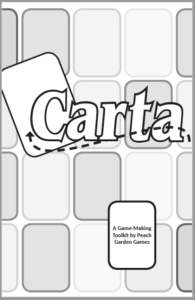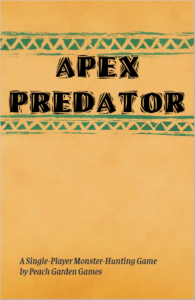 After reading Cleo Coyle’s absorbing Honey Roasted for work the other day, I was seized with the desire to write a game revolving around different kinds of single flower honey. I knew I wanted it to be connected to my Six Elements Universe, but I very specifically wanted it also to be an exploration game where you could use the different kinds of honey you were transporting with you to boost your travels through potentially dangerous terrain.
After reading Cleo Coyle’s absorbing Honey Roasted for work the other day, I was seized with the desire to write a game revolving around different kinds of single flower honey. I knew I wanted it to be connected to my Six Elements Universe, but I very specifically wanted it also to be an exploration game where you could use the different kinds of honey you were transporting with you to boost your travels through potentially dangerous terrain.
My mind thus turned to the Carta system by Peach Garden Games. PGG released Carta’s System Resource Document last year for free, and I’d been interested since first learning of the system in developing a game for it. I never quite had the right idea, I felt, till the honey game, so was excited to finally be able to sit down with the SRD to give it a proper read through and make sure.
Carta is essentially a tabletop exploration game where players traverse a grid of playing cards, with each card providing a different sort of prompt for your story. You can theme it quite freely, as quite a number of developers already have. The SRD is cleanly written, giving you clear instructions without a lot of extraneous clutter: a perfect scaffolding from which to build more complex delights. It seemed a great fit for the game I had in mind, but in order to make sure that I knew what I was in for, I decided I wanted to check out examples of other games created using this system.
 The first game I downloaded was Apex Predator, the first Carta game ever written. Inspired by the Monster Hunter video game series, it gives players an analog version of navigating various wild landscapes in order to hunt and vanquish up to four deadly creatures. Players only need a standard deck of playing cards, a 10-sided die and a marker to keep track of their position on the board, as well as some way of noting down not only their journey (optimally via journaling) but also any changes to advantages they might encounter in the course of the hunt. It’s a solid game with high replay value, and assured me that I was definitely on the right track with adapting this system for my own game.
The first game I downloaded was Apex Predator, the first Carta game ever written. Inspired by the Monster Hunter video game series, it gives players an analog version of navigating various wild landscapes in order to hunt and vanquish up to four deadly creatures. Players only need a standard deck of playing cards, a 10-sided die and a marker to keep track of their position on the board, as well as some way of noting down not only their journey (optimally via journaling) but also any changes to advantages they might encounter in the course of the hunt. It’s a solid game with high replay value, and assured me that I was definitely on the right track with adapting this system for my own game.
But I’m a fan of more research rather than less, so decided to check out also Into The Glacier, another Carta-based game by PGG. This game adds on to the complexity of Apex Predator by giving players four different scenarios and targets for retrieval as they head into a mystical glacier. The prompts are even more sophisticated than in PGG’s previous games, really allowing players to lean in to either a cozier or grittier fantasy realm vs AP’s rather single-minded hunt scenario.
 And so armed with this knowledge, I went ahead and started developing my own game. I’ve finished the first text draft and completed several playtests, both for solo and co-op play. I’m gonna throw it into Canva soon, but now that the initial pressure to create has abated somewhat, will likely work on finalizing the minutiae of the art layout version of Equinox, my biggest game project so far, before continuing with that. I’m really pleased that I could so efficiently design the game I had in mind using this excellent, adaptable system, tho! If you’re at all interested in tabletop roleplaying game design, especially for single player, then I highly recommend taking a look — again, downloads of the SRD are free! As well, the titles listed here are also excellent ways to get into solo journaling games, whether you’re a novice to tabletop role-playing or someone ready to branch out a little from what you currently play.
And so armed with this knowledge, I went ahead and started developing my own game. I’ve finished the first text draft and completed several playtests, both for solo and co-op play. I’m gonna throw it into Canva soon, but now that the initial pressure to create has abated somewhat, will likely work on finalizing the minutiae of the art layout version of Equinox, my biggest game project so far, before continuing with that. I’m really pleased that I could so efficiently design the game I had in mind using this excellent, adaptable system, tho! If you’re at all interested in tabletop roleplaying game design, especially for single player, then I highly recommend taking a look — again, downloads of the SRD are free! As well, the titles listed here are also excellent ways to get into solo journaling games, whether you’re a novice to tabletop role-playing or someone ready to branch out a little from what you currently play.
Links have been included throughout this review, but you can also grab all the titles, as well as see what else Peach Garden Games is working on and has available, through their itch.io link here.
